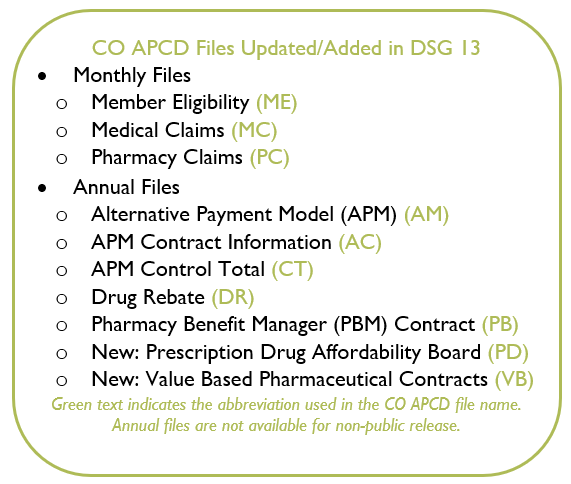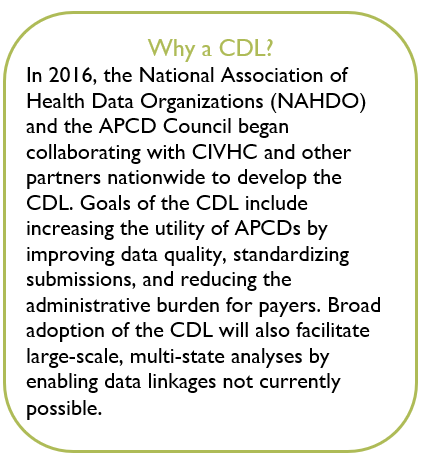Part of being a good steward is ensuring that your charge thrives under your guidance. To this end, Center for Improving Value in Health Care (CIVHC) is continually working to improve the quality and utility of the Colorado All Payer Claims Database (CO APCD). One of the most substantial activities to enhance the CO APCD is the annual updating of the CO APCD Rule and the Data Submission Guide (DSG) in collaboration with the Department of Health Care Policy and Financing (HCPF), the Division of Insurance (DOI), and health insurance payers across the state.
Using the HCPF Executive Director Rule Change Process, data elements are added, eliminated, or clarified in the DSG, and the language in the CO APCD Rule – Colorado Regulation 1.200 – is changed. Generally, these updates include
- standardization or clarification of elements already being collected,
- addition of new elements that will either further align CO APCD data submissions with the Common Data Layout (CDL) being used by APCDs throughout the nation, or
- increase its ability to support and inform efforts to improve health care for Coloradans.
Each Rule Change/DSG update cycle takes over a year. The CIVHC team began working on the new Rule language and DSG 13 in 2020, meeting with payers and stakeholders to discuss needed information and the feasibility of possible changes. Public meetings, comment periods, and multiple DSG drafts later, CIVHC submitted the final paperwork to HCPF in December 2021, and the changes were approved in February 2022.
DSG 13 and the revised CO APCD Rule were effective March 1, 2022, and the payers have 120 days to make the necessary alterations to their systems to comply with the new submission requirements. DSG 12 remains active until the end of May, with June being the first month when files under DSG 13 are due. This timeline outlines the steps surrounding the implementation of DSG 13. CO APCD data that is eligible for non-public release based on DSG 13 will be available in late 2022.
It is important to note, that not all new data elements will be complete with the first submissions as it often takes the payers time to fine tune new submissions. CIVHC’s data intake quality analysts pay particular attention to new data fields and conduct additional quality checks to ensure accuracy. Often it takes several months for payers to accurately submit new fields, and the CIVHC team works closely with the payers to answer questions and provide technical assistance. Additionally, some data elements are not available on a non-public basis and/or are submitted once a year rather than monthly, and also require additional validation and quality control. If you’re interested in a particular data element that will be new to the database as outlined below, and would like more information on completeness and timing for non-public releases, please contact info@civhc.org.
DSG 13
DSG 13 adds two new annual file submissions to collect information to help reduce prescription drug costs:
- Data to support the Prescription Drug Affordability Board (PDAB) created by SB 21-175 by allowing them to see which drugs account for the highest spending in Colorado, while
- Data regarding value-based pharmaceutical contracts (VBPC)to understand how prescriptions reimbursements are structured.
DSG 13 updates to previously collected elements include clarifications and corrections to data fields that will improve the quality of submissions as well as some significant additions to the information that will align the CO APCD with the CDL while providing new insight into health care in Colorado. Notable additions center on information surrounding language preference, the health care insurance marketplace, prescription drugs, and the cost of care.
- Language Preference – capturing language preference will provide insights into health equity and access
- Health Insurance Marketplace
- Market Options – collecting data related to various health insurance markets such as Municipality, Student Health, Short Term Limited Disability, and Taft-Hartley plans
- Colorado Option Indicator – tracking information related to the state Colorado Option health plan
- Prescription Drugs
- Therapeutic Class – this field will help calculate spending and rebate information at the drug class level
- Cost of Care
- Premium Information – gathering this data will help stakeholders understand a more complete view of cost of care in Colorado
- Out of Pocket Maximum and Member Deductible Data – collecting this information will allow for calculation of true member out of pocket costs
Premium and deductible information will only be released to the Colorado Division of Insurance during the first year of collection.
CO APCD Rule
Revisions to the CO APCD Rule were less extensive than those impacting DSG 13 and mainly concerned clarification of definitions and increasing the fines to payers for non-compliance with submission requirements:
- Separate each file type in the definitions section
- Add a definition for “Anti-trust safety zone” to clarify CIVHC’s anti-trust processes
- Clarify that Medicare Supplemental plans and Medicare Advantage are required plan types for CO APCD submissions
- Clarify language surrounding the requirement to submit non-ERISA self-funded data
- Clarify that the CO APCD administrator cannot release data from the APM files, the Drug Rebate files, or the VBPC files to external requestors
- Increase fines for payers that do not comply with the CO APCD
While the payers are working to prep their test files for DSG 13 submission in the coming months, the CIVHC team is already working on DSG 14, considering elements that could add new insights, how collection can be refined, and what updates are necessary to keep the CO APCD at the forefront of claims analysis and support for Change Agents.
If you have questions about DSG 13, the CO APCD Rule, or want to suggest a topic for a Query CO APCD: Data Quality, please email us at info@civhc.org.